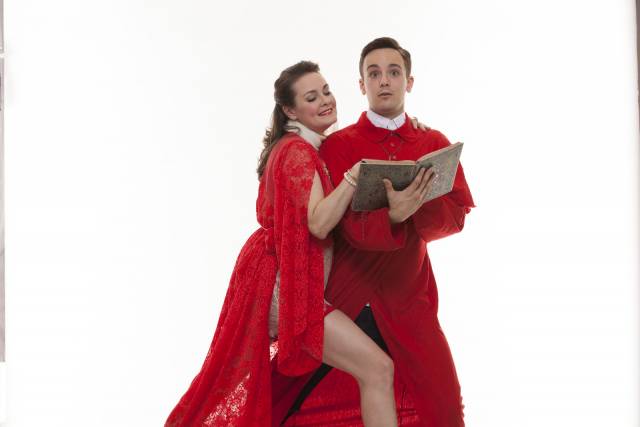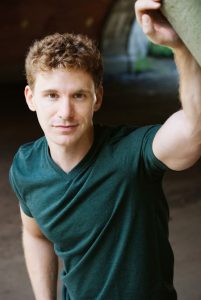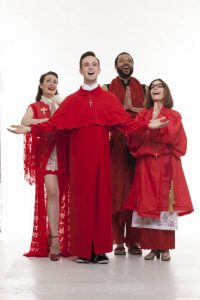

Popesical!, a musical by Adam Overett, is set during the papal conclave, the election in which cardinals vote for a new pope, and it features a motley crew of cardinals who are put through successively absurd tests to prove their fitness for the papacy. Overett, who is a composer, a lyricist, a director, an actor, and a writer, is also an extremely warmhearted satirist; he expresses as much wonder as mockery about the religious community’s faith in the objectivity of the totally secret papal selection process, and offers up his own ingenious guesses as to what the qualifying tests are (“Biblical Chairs”). God knows (not that it bothers Him) that a satire on Catholicism usually means an all-out attack on the church, but Overett is more of a bemused observer with an appreciation for both the sincere devotion of religious faith and the inherent ridiculousness of electing a flawed, desperate person to a position of infallibility.
Why do you think so few musicals have been written about the Pope? I have to say that this is the first Pope-themed musical I’ve seen.
I know. There’s so much pageantry and performance and ritualism wrapped up in the higher levels of the Catholic Church; it’s an inherently theatrical organization. You’d think it would lend itself to a musical naturally. Maybe people are afraid to take on a sacred cow, but then there are plays like Jesus Christ Superstar!, there are little funny religious skits I’ve seen. It seems like it should be more common.
When you were doing research, what did you learn about the way papal conclaves actually operate?
It’s kept so secret – there’s some knowledge of the procedures they go through, but the fact that it’s so secret and has been kept secret for so long was helpful to me; I deliberately wanted to show the Cardinals doing things as part of the selection process that you would never see happen in real life. We know one thing, that they show black or white smoke coming out the chimney, so whatever happens in between them coming into the chamber and the smoke coming out, I felt I could dramatize for comic effect, because we have no idea. It’s part of what makes the Conclave so interesting – the intense secrecy lends itself to the imagining of ludicrous procedures.

Popesical! is a satire, but you’ve spoken about your appreciation for Catholicism, and you’ve said that you hope people come away from the play with generous feelings towards faith. Was there a particular point when you decided to write a warm satire as opposed to a bitter one?
I did approach the play from a satirical point of view, but I found the heart of it as I was working on it. I originally just thought that the papal conclave was a funny idea to play with – the central joke being, the selection procedures are so, so secret, let’s pretend that they’re secret because they’re outrageous and ludicrous -- but as I worked on it, I found myself thinking about the main character, who desperately wants to be Pope. Why does this guy want to be Pope so badly? How does he prove to himself, and to the people around him, that he’s really the best person to be the Pope? What kind of test could you pass to prove that to people? So I explored those comic possibilities as a satirist, but I was genuinely interested in how somebody would demonstrate their aptitude for being the Pope. There is a right person, so what does that mean? The main character [Cardinal McCafferty] wants to be the Pope because being the Pope would mean he was being the greatest person he could be. Isn’t that true for everyone?
The people we want to be are the greatest people we think that we could be. The highest example of that is maybe being a disciple of Jesus – your boss is the best person on Earth, so how do you emulate him? Those questions formed the heart of the play for me. I enjoy having fun with the possible rituals of the papal conclave, but I find deep faith to be very moving; I’m not coming from a place of harshness. I appreciate when people are humble enough to devote themselves to something outside of themselves, something transcendent. Look at the Sistine Chapel. Look at Bach, who wrote his beautiful music for the greatness of God; whether you’re religious or secular, you can experience the love that Bach and other artists had for divinity. So I’m moved by religion, and there are parts of it that I think have comic potential, that I have fun with.
It sounds like you may be ready to move from a comedy about the Pope to a drama about him.
Yes, my hope is that people come for the comedy and stay for the meaning; we can laugh together, but hopefully we’re moved together, and that’s the thing that engenders discussion.
Have you had positive reactions from people of the faith?
I have – the more religious members of my audience are, the more they seem to respond to the play. I think that even very religious people realize that there are things about all of our holy systems that are kind of funny and silly, and that we all like to laugh at ourselves a little bit. And they can discern that the underlying message of the show is respectful. They get that it’s – at least meant to be - a loving satire, not a biting one. I have had a couple of people who are familiar with Catholicism and the Vatican come; one person who was affiliated with the Church saw the play and told me, “Well, it’s a great mix of truth and, you know, other stuff.”
In the Renaissance, Cardinals often earned votes through bribery and political favors, so, in a way, your depictions of the selection procedure are very generous.
Yes, they’re all ludicrous people, but they’re earnestly trying to prove their worth.
At one point, it’s revealed that the previous Pope appointed Cardinals willy-nilly because he was senile. Was this a way to make fun of the qualifications of real, past candidates who have been up for the papacy?
Under certain circumstances, the Pope is considered to be infallible, at least when he’s speaking ex cathedra. So I wanted to have a Pope be very human and go a little nuts and appoint a bunch of unlikely cardinals to make fun of the situation. And also, I wanted people interesting enough to have a bunch of different reasons for wanting the top job. Cardinal Robin wants it for the fashion opportunity.
Has your attitude towards the Church changed in recent years?
I’m certainly fascinated by the arrival of Pope Francis. I wrote Popesical! under Benedict, and it was not long after the writing that Benedict resigned and Pope Francis appeared, so I’ve gotten to watch his relationship to the world; I think he’s shifted the usual conversation with the press in an interesting way. He’s not changing doctrine – he said some famous thing like, who am I to judge the underlying doctrine of the Scriptures, but he does seem to be changing people’s attention and focus, and that’s fascinating. He’s interested in the cultural relationship of the Church to the world.
Another topic – who are your heroes in musical comedy?
Like for everyone working in the field, Sondheim is my highest lyrical idol. I feel like I’ve learned a lot from Bobby [Robert] Lopez and the South Park guys, The Book of Mormon; I feel like I learned a lot from my friend Kellen Blair, who wrote Murder for Two, which I was a part of for a while; they’re really funny guys, great storytellers; when I was in Murder, I picked up a lot of comedy tips; every night we were saying, “Wow, making people laugh is really fantastic.” I think Pete Mills is a great writer. Like everyone else these days, I adore Lin-Manuel Miranda, I loved, loved In the Heights and Hamilton. Glenn Slater, another hero.

You’ve said you’re interested in the blurring of the line between ordinary life and heightened, dramatic presentations, a theme of your play My Life is a Musical. As a Sondheim lover, did Into the Woods, contribute to that interest, because it played with realistic consequences for storybook characters?
Into the Woods was a huge watershed play for me. I think being a young kid then, it had a big effect. And it wasn’t just the real consequences in these fairy tale situations; it was the fairy tale situations with the larger-than-life characters that added to the drama. They live in this kingdom, with all these magical elements; it’s pre-heightened, and the fact that it’s a musical adds extra intensity. But it’s very stark. I’m interested in musicals partially because they are heightened depictions of a world; you see more of any world when it’s inside a musical.
In My Life is a Musical, the main character thinks everyone around him is singing when they’re actually talking. It seems to me like you’re poking fun at the excessive theatricality of musicals while also appreciating the narrative potential that comes with their super-dramatic aspects.
Yes, exactly. That’s what was going on in Popesical! I’m having a lot of fun, poking fun at something that I have a lot of respect for. I mean, I write musicals, lyrics, musical conventions, this is my life. But I also look at musicals and say, “This is really kind of silly, what we’re doing here, having people break into song in the middle of speech, this doesn’t really happen.” Though that’s the first thing that people who don’t like musicals say – “Oh, this would never happen, it’s so unrealistic.” So I like holding musical conventions up to the light and saying, “This is silly, and it’s silly because every time it goes up on stage, we buy it, but it’s inherently ridiculous.” But at the same time, there’s so much heart and truth in theatricality, and when I see a wonderful musical, I don’t feel it’s untruthful. The music in great musicals seems like a metaphor for emotional connection, to me; it’s about living in the world and experiencing it. I have conflicted feelings about it.
Do you think that being a performer yourself influences your writing?
Absolutely. I know what it feels like to have to read text that is overwritten – to say more than is necessary, written in a way that doesn’t sound like the way people really talk – and I know what it feels like to have to read text that is underwritten, where I don’t understand what’s going on. Understanding what a character wants, which is what I tried to do as an actor, is everything to me as a writer. So I work really hard to give something to an actor that they would be excited to play with; I try to think about how I would play a scene if I was playing the part I’m writing.
Did you start writing when you started acting, or did frustrations with bad writing motivate you to do it better, yourself?
As long as I remember, I’ve wanted to write and perform. I have a very distinct memory, as a kid, of listening to cast albums, and thinking, “I want to be in this, and also to have made it.” So I’ve always wanted to do both. As a kid, I was singing and acting in school plays, and I was trying to write these huge novels as a third or fourth grader, which of course no one will ever see, but the point was that I knew I wanted to write stories while I was in other people’s stories the whole time. They’ve always kind of fed each other, writing and acting.
What’s it like working with actors who are also playwrights themselves?
It’s a really good dynamic. Many actors now, and probably always, write as well as act. The further you get into this art form, the more you want creative control to tell your story. Joe Kinosian, who co-wrote Murder for Two, is a good example of a writer and performer who’s aware of what it’s like on both sides. I appreciate having those people around.
You know, Pope Francis is in New York City today. Do you think he would enjoy Popesical!?
Yes. I hope so. I think he would really enjoy it a lot. I have to think that the heart of the show is a message that the Pope would find very friendly. And, from what I understand, he’s a great guy; he has a good sense of humor. Invite him Monday.
Popesical! plays September 28 through October 26 at the Soho Playhouse.